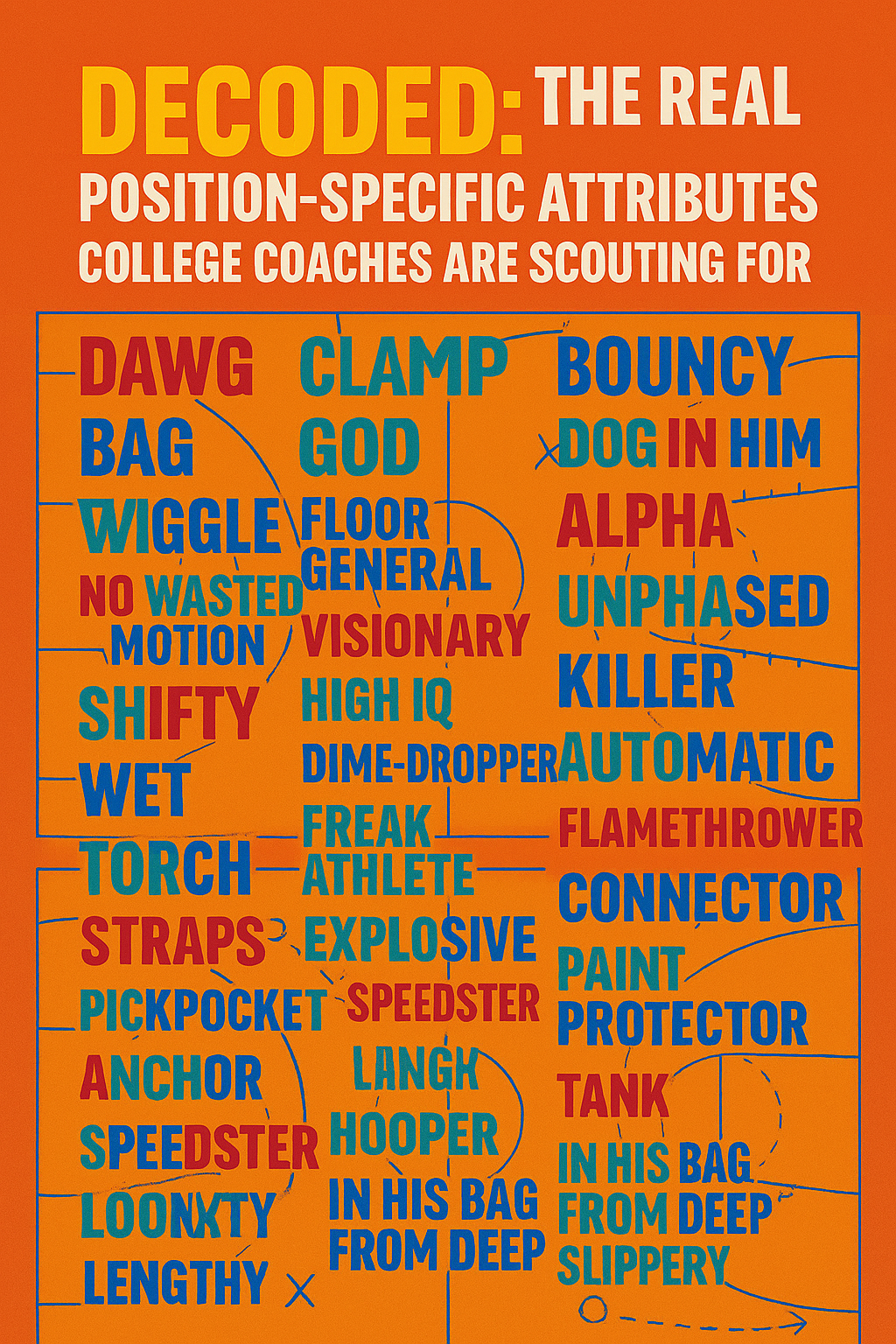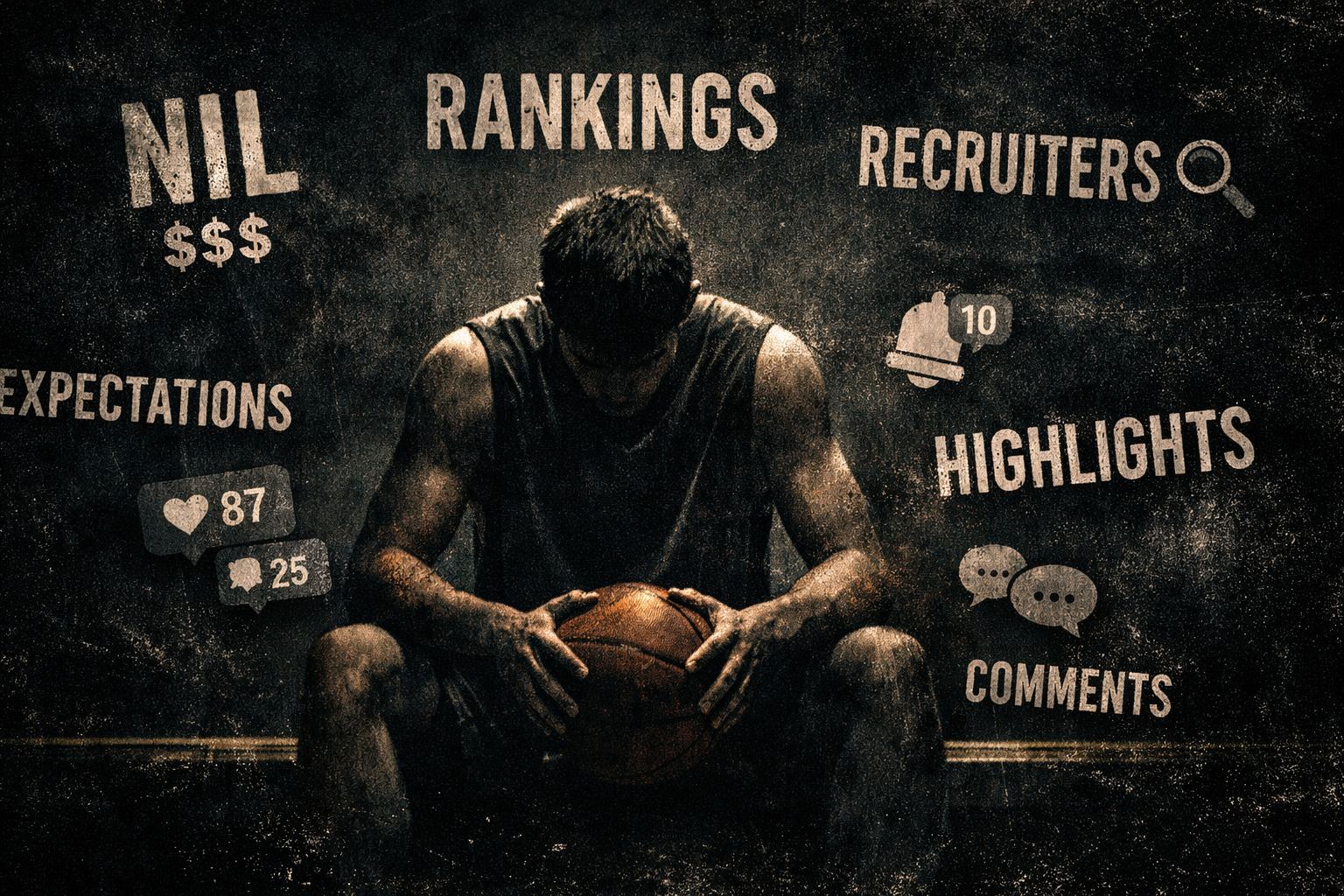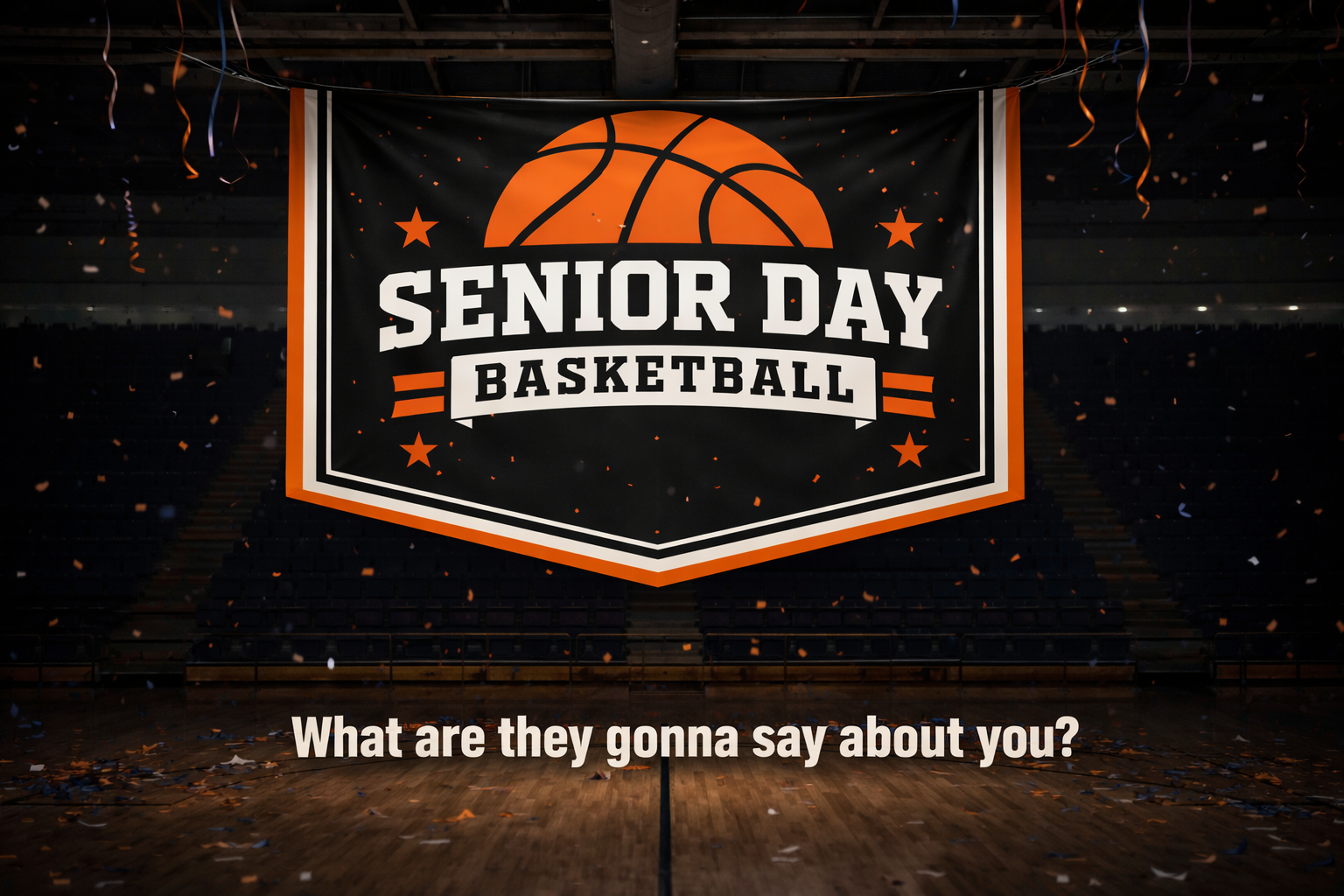Decoded: The Real Position-Specific Attributes College Coaches Are Scouting For
BY HOOPWRLD STAFF | RECRUITING INSIGHTS
As a high school hooper with dreams of competing at the college level, you’ve probably wondered what coaches are actually looking for when they watch you play. Everyone loves the flashy player who’s “him” on the court, but what really catches a coach’s eye goes way beyond dropping 30 in a game. Sure, they track your points, rebounds, and assists—but the qualities that truly separate prospects go far beyond the box score.
After speaking with dozens of college coaches across all divisions, I’ve compiled the definitive list of attributes they value most—broken down by position. These aren’t just empty buzzwords; they’re the specific qualities coaches mention when they’re excited about a recruit.
What Makes All Great Players Stand Out
Before diving into position-specific traits, let’s acknowledge the universal attributes that coaches value in every player they recruit:
- Coachable: Nothing—and I mean nothing—turns coaches off faster than a player who thinks they know everything. Your willingness to receive feedback and apply it immediately makes coaches believe they can develop you.
- Hardworking: Talent gets you noticed, but work ethic gets you recruited. Coaches want players who will maintain intensity in practice, not just games.
- Competitive: Do you hate losing more than you love winning? That’s the mindset coaches are seeking.
- Team-First Mentality: The days of the “me-first” star are over. Programs want players who genuinely celebrate teammates’ success.
- Self-Motivated: Coaches shouldn’t have to beg you to put in extra work. The best prospects are already in the gym before anyone asks.
- High IQ: Understanding situations, tendencies, and making rapid decisions separates elite players.
- Explosive: The ability to change speeds and directions creates advantages all over the court.
- Gritty: That willingness to do the dirty work and embrace physical play is invaluable.
- Clamp God: Taking pride in your defense and shutting down your matchup always gets noticed.
Now, let’s break down what coaches look for in each position:
Point Guard: The Floor General, Dime Dropper, and Hesi God
What Makes Great Point Guards Stand Out:
- Floor General: Can you control game tempo and get teammates into offensive sets? This is point guard job #1.
- High Basketball IQ: Making the right read at the right time separates elite point guards from average ones.
- Visionary: Do you see passing lanes before they develop? Can you recognize mismatches instantly?
- Vocal Leadership: Point guards must communicate constantly. If you’re quiet by nature, this is an area to develop immediately.
- Poise Under Pressure: Nothing impresses coaches more than a point guard who stays composed when defenses ramp up the pressure.
- Shifty: Can you break down defenders with your handle and create space with hesitation moves?
- Slippery: Elite point guards navigate through tight spaces and escape traps with ease.
- Gets Downhill: The ability to attack the rim with speed and purpose opens everything up for your team.
- Float Game: Having that touch to drop floaters over bigs shows you’ve got multiple tools in your bag.
“I’m looking for a point guard who’s a true floor general and visionary—someone who makes decisions that make me nod my head in agreement from the sideline. I want a PG who can drop dimes in traffic, has that nasty hesi move that makes defenders dance, and thinks the game one step ahead of everyone else on the floor. Show me a guard who’s slippery enough to get through tight spaces but still sees the whole floor—that’s my connector and extension on the court.” – Division I Head Coach
Shooting Guard: The Sniper, Flamethrower, and Bucket Getter
What Makes Great Shooting Guards Stand Out:
- Wet Jumper: Your shot should be reliable and automatic from multiple distances and angles.
- Confident: The best shooting guards are stone-cold killers who believe the next shot is always going in, regardless of previous misses.
- Clutch: Can you hit shots when defensive pressure increases in crucial moments?
- Slick: Elite shooting guards create scoring opportunities through creativity when plays break down.
- Two-Way Impact: Gone are the days when shooting guards could just score. Today’s recruits must commit to defense.
- Three-Level Scorer: Can you get buckets at the rim, mid-range, and from deep?
- Catch-and-Shoot Killer: Being able to fire quickly off the catch keeps defenses honest.
- In His Bag From Deep: The range to pull up from NBA distance changes how defenses guard you.
- Finisher: Converting through contact at the rim makes you a complete offensive threat.
“Sure, I love a pure sniper who can light it up from deep, but give me a shooting guard who impacts winning even on nights when they’re not in their bag. I want that flamethrower who can heat up in seconds, that certified bucket-getter who’s automatic from the corners. A true three-level scorer who still finds ways to cook defenders and impact the game when shots aren’t falling—that’s who I want in my program.” – Division II Assistant Coach
Small Forward: The Ultimate Swiss Army Knife, Glue Guy, and Slasher
What Makes Great Small Forwards Stand Out:
- Versatility: Can you guard multiple positions? Score in different ways? These questions define the modern wing.
- Two-Way Player: Elite small forwards affect the game on both ends of the floor consistently.
- Impact Player: Small forwards often make game-changing plays that don’t show up in standard statistics.
- Balanced Skill Set: The ability to score, facilitate, and defend makes you irreplaceable.
- Court Awareness: Understanding spacing, defensive rotations, and opportune cutting lanes is crucial.
- Slasher: The ability to attack closeouts and finish at the rim keeps defenses honest.
- Lengthy: Using your wingspan to disrupt passing lanes and contest shots adds defensive value.
- Connector: Elite wings make the extra pass that transforms good offense into great offense.
- Stretch Ability: Knocking down corner threes creates space for everyone else to operate.
“When recruiting wings, I’m looking for that elite glue guy with length who can be a problem on both ends. I need a slasher who can attack closeouts and still knock down that corner three consistently. I’m watching how they impact possessions without the ball and how they get busy on defense. That tells me everything about their basketball intelligence and if they’re built different. Give me a wing who’s a connector on offense but can also lock up the opponent’s best player when it matters.” – Division I Recruiting Coordinator
Power Forward: The Dawg in the Paint, Problem Creator, and Bully
What Makes Great Power Forwards Stand Out:
- Gritty: Shows toughness in physical situations without backing down.
- High Motor: Coaches love bigs who sprint the floor every possession and chase every rebound.
- Fundamentally Sound: Footwork, positioning, and understanding angles separate elite bigs from athletic bigs.
- Versatility: The ability to defend on the perimeter while maintaining interior presence is increasingly valuable.
- Disciplined: Staying in position defensively without gambling is crucial for team defense.
- Bully: Can you establish position and move defenders with your strength?
- Paint Beast: The ability to score consistently in the post creates gravity for your offense.
- Stretch: Modern power forwards need to knock down open threes to maximize spacing.
- Tank: Absorbing contact while finishing plays shows true power forward mentality.
“I want a power forward who’s a true dawg in the paint—a straight-up bully who can be a paint beast when needed. Someone who plays with that dog mentality but never loses focus. They’ve got to bring that grown-man strength, be physical but not reckless. I’m looking for that tank who can move people around in the post but still has touch around the rim. That stretch-4 who can still bang inside. That balance is rare and incredibly valuable.” – Division I Post Coach
Center: The Rim Protector, Glass Cleaner, and Anchor
What Makes Great Centers Stand Out:
- Defensive Anchor: Can you protect the rim and communicate rotations to teammates?
- High Basketball IQ: Understanding positioning and timing is more important than raw athleticism.
- Team-First Mentality: Elite centers focus on team defense rather than personal highlights.
- Vocal Presence: Centers see the entire court defensively and must communicate constantly.
- Resilient Mindset: You’ll face physical play every night—how you respond defines you.
- Paint Protector: The ability to alter shots without fouling is invaluable.
- Bouncy: Explosive jumping ability to contest shots and grab rebounds in traffic.
- Freak Athlete: Natural athleticism that creates mismatches on both ends.
- Length: Using your wingspan to protect the rim and finish around smaller defenders.
“Give me a center who can be a true eraser at the rim, a legitimate anchor for our defense, and clean the glass like it’s their job. I want that paint protector with the length and timing to alter shots without fouling. I need a big with the bounce to finish lobs but the discipline to stay down on pump fakes. I’m looking for someone who takes pride in altering shots more than chasing blocks for the ‘gram, who cares about defensive positioning more than highlight plays. That big who makes guards think twice about driving the lane—that’s who I want anchoring my defense.” – Division III Head Coach
Turning Potential Into Recruitment
Understanding these attributes is only the first step. Here’s how to demonstrate them to coaches:
- Film Doesn’t Lie: Coaches watch how you respond to adversity, interact with teammates, and maintain effort when tired.
- Practice Habits Matter: Coaches often show up to practices unannounced to see your everyday approach.
- Body Language Speaks: Your non-verbal communication during games tells coaches volumes about your character.
- Consistency Trumps Flashes: Coaches value reliable performance over occasional brilliance.
- Growth Mindset: Document your improvement in specific areas to show coaches your development trajectory. Be about that work, not just the hype.
The Final Whistle
The path to college basketball is challenging but straightforward: become the player who embodies the attributes coaches value most at your position. While you can’t control your natural height or wingspan, you absolutely can control whether you’re coachable, hardworking, and team-oriented.
Remember this: coaches aren’t just building teams—they’re building programs. They’re looking for players who fit both their system and culture. By focusing on developing these position-specific attributes, you’ll transform from a player with potential into a recruit that coaches can’t ignore.
The rock is in your court. Which attributes will you level up next to become that player coaches can’t stop talking about?
This article features insights gathered from interviews with dozens of college coaches across all NCAA divisions. HOOPWRLD sat down with these coaches to discover what they’re REALLY looking for when scouting high school talent.




